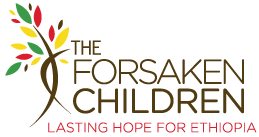The overarching message of a conference I attended several months ago was well summed up by this quote used by the organization Give a Child a Family, based in South Africa:
“Every child deserves to have an adult who is crazy about them.”
Realistically this is saying that a child needs and deserves to have a primary care taker to truly develop and grow healthily. Personally, I have believed this since Karyn and I participated in Youth With A Mission’s Children at Risk School in 2006 where we were enlightened to the fact that this is God’s original intent for every child. Since 2006 our challenge has been to determine how we can and will implement this understanding within the work of The Forsaken Children and its partner project Children’s Home Ethiopia.
The challenge comes when you consider the vast amounts of children in our world who are for some reason or another not in a family. Some of the reasons include: poverty, abandonment, illness, war, and child parents. Whatever the reason for the epidemic of family-less children, many of us need to evaluate or reevaluate our response to this problem, especially in Africa.
Some of the popular responses that are being attempted are orphanages, foster care, and intercountry adoption. There are pros and cons to each of these responses. Many of the pros are easy to discern, which makes each of these approaches popular. The overarching pro to each response is that family-less children are being cared for and in some form or another, given families. Let me just say a little more about each of these responses and in doing so, I hope to provoke you to think critically about your response.
- Orphanages - The problem with institutions such as orphanages is that the children involved don’t really learn how to be a part of a family. Their caregivers are usually paid staff who punch a time clock. Children in most institutions typically lack the primary care giver that is integral to a child’s healthy development. I will say that there are situations, especially in many of Africa’s developing countries, where orphanages are a necessary response, especially until a better alternative can be created.
- Foster Care – I think we have all heard of instances in foster care where children have been mistreated, moved around, or simply ran away. Although these things do occur in foster care, with proper assessments and monitoring (in other words, a lot of work), foster care may be one of the promising strategies for putting children into families. Foster care can also include extended family care and community family care (especially in the African context).
- Intercountry Adoption – The adoptive family is sometimes an answer for children without families. Increasingly, intercountry adoptions are becoming popular and many children are blessed to receive forever families through this process. However, problems do occur when, “international adoption agencies work not to find homes for needy children but to find children for Western homes.” (The Lie We Love, E.J. Graff) When this occurs, the adoptions become less about the children’s best interests and corruption enters the system. Unfortunately, this corruption, no matter how large scale or small scale, could eventually destroy this viable response for the children who would benefit from intercountry adoption.
So there you have it. The family is under attack worldwide. We as believers have a responsibility to fight back on behalf of this God-ordained unit and on behalf of the children who are suffering due to their own families’ breakdown. Obviously, there are many different opinions out there about how to care for family-less children in Africa and where you live as well. I challenge you to consider what you believe. It is unacceptable that children are continuing to live outside of families. How will you respond?
In Part Two I will explain The Forsaken Children’s response.
